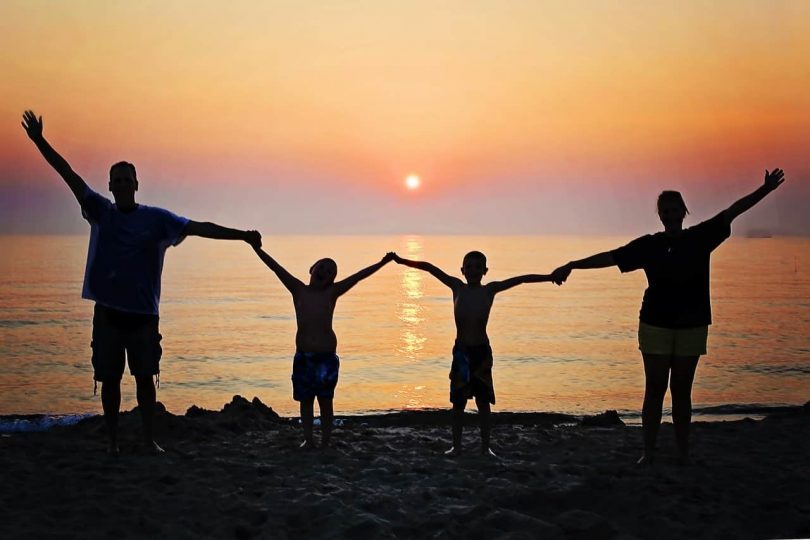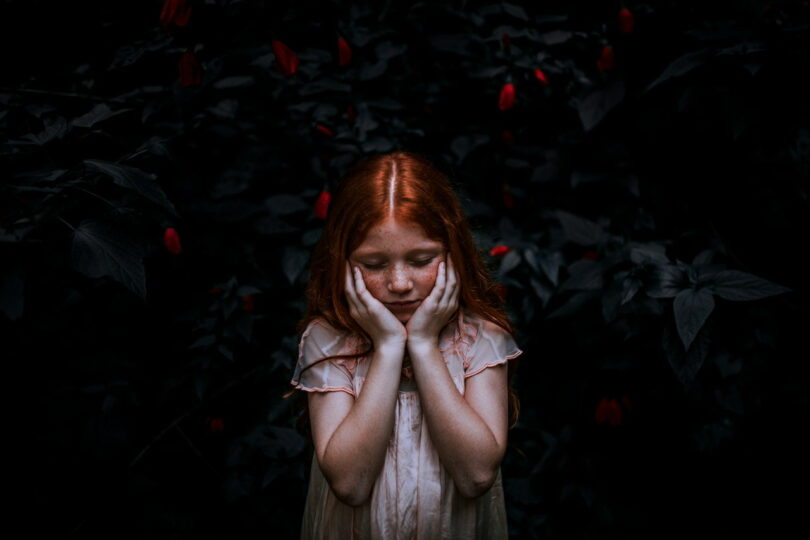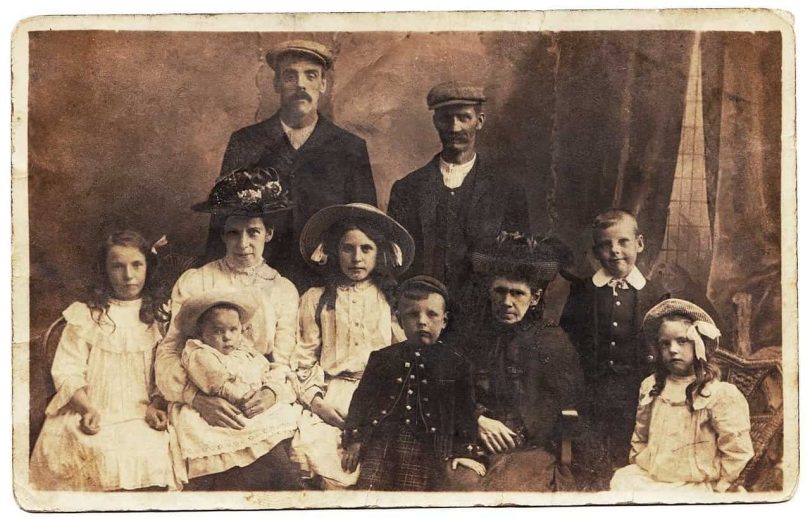All children deserve parents who are caring, attentive, receptive, and emotionally mature.
Sadly, the reality is that many of us were born into families who had the emotional intelligence of brick walls. This led to us feeling a sense of being abandoned, ignored, rejected, and never truly seen or appreciated for who we were.
If your parents were distant, self-preoccupied, and insensitive, you likely had an emotionally immature parent.

Soul Work Compass Course:
Feeling lost, stuck, and trapped in repetitive cycles of pain? Discover your Soul's Compass to reclaim your purpose and find your path to freedom.
⭐️⭐️⭐️⭐️⭐️ "I have been a long-time subscriber to their website, and it’s one of my favorites by far ... It is rare to find this type of teacher." – Shar B.
Table of contents
- What is Emotional Maturity?
- 19 Signs of Emotional Maturity (in Parents & People in General)
- Being Raised By Emotionally Immature Parents is Traumatic
- 19 Signs Your Parents Are Emotionally Immature
- Are Emotionally Immature Parents Also Narcissists?
- 4 Types of Emotionally Immature Parents
- How to Stop Being Controlled By Emotionally Immature Parents
What is Emotional Maturity?
Emotional maturity is the ability to be comfortable with a wide range of intense or conflicting emotions (whether positive or negative). Those with emotional maturity are sensitive, perceptive, empathetic, receptive, and attentive to the needs of themselves and others. They are able to manage their emotions as well as hold space for the emotional complexity within others.
19 Signs of Emotional Maturity (in Parents & People in General)

Let’s look at emotional maturity more in-depth. Emotionally mature people:
- Are realistic
- Are reliable
- Can think and feel at the same time
- Work with reality (rather than fight it)
- Can laugh good-naturedly at themselves
- Don’t take everything personally
- Have consistent personalities
- Respect your personal boundaries
- Reciprocate giving and receiving
- Are courteous
- Are sensitive
- Are flexible and can compromise
- Are empathetic (which makes you feel safe)
- Are even-tempered
- Value your individuality
- Are self-reflective (and willing to change)
- Are interested in getting to know you
- Can laugh and be playful
- Can listen attentively and compassionately
Emotionally mature people are, overall, nice to be around. You feel safe and truly seen in their presence. There is a sense of reciprocity and genuine interest in learning more about you. There is no need to walk on eggshells around them as they are even-tempered, flexible, and down-to-earth. These good-natured and empathetic souls are not scared of emotional complexity or intensity but instead embrace it with love.
Being Raised By Emotionally Immature Parents is Traumatic

Stop for a moment and let me ask you this question: how many of the above characteristics did your parents possess?
If you answered less than five, no doubt about it, you have an emotionally immature parent.
Now, I’m not here to condemn your parents or reinforce a victim/persecutor complex. I’m here to help you face the truth about your childhood and how to overcome the trauma you’ve likely undergone because of it.
Being raised by emotionally immature parents is traumatic.
Want to get LonerWolf at the top of your Google search results?
There’s no getting around it.
It wounds us on a deep level to not be truly seen, heard, or valued. Something within us is suffocated when we are emotionally and psychologically neglected. Something within us breaks when we experience the unfathomably deep loneliness of never being truly seen.
In my own experience of being raised by two emotionally immature parents, one of the most debilitating and profoundly painful wounds I’ve carried has been an unshakable sense of emptiness, loneliness, and fundamental abandonment.
It was only recently when I discovered how soul-deep these traumas cut when, on holiday, I collapsed into a shaking ball of sobs and loud weeping that gushed from me like intense tidal waves. I suddenly realized that I had never truly felt like I existed. I suddenly realized that I had never truly felt seen. No one, not a single soul, had ever truly seen me – not my siblings, my extended family, my friends, my teachers, and certainly not my parents. All anyone had ever done was project their ideas and beliefs onto me, none had ever seen me.
As I held this shaking child within me, it dawned on me how thankful I was to find an emotionally mature partner, someone who could see me. And also, how unspeakably sad it is for a child to be born into a family who is technically present, but offer little in the way of help, protection, or comfort.
As decent human beings, it’s our job, our duty, to learn and evolve. But emotionally immature people are stuck in a stagnant standstill; refusing to deal with our shared emotional reality due to their own unresolved inner wounds.
Download FREE Emotional Maturity Worksheets!
Go deeper with an emotional maturity journaling prompt + printable meditation mandala!
19 Signs Your Parents Are Emotionally Immature

To our inner child – the young and vulnerable place within us – coming to terms with the ugly truth about our parents can be terrifying. It can feel like a grievous betrayal of trust. After all, we still want to please our mommy and daddy, right? (On some level, most of us continue to feel that way.)
But at some point, we need to step into the role of adult, take our inner child by the hand, and go on a journey of healing. This journey requires us to pull apart our childhood, piece by piece, and examine how it impacted us (this is the crux of inner child work, by the way).
For many people, the journey toward true adulthood, or what psychoanalyst Carl Jung referred to as individuation, starts with shining the spotlight on our parents.
So let’s begin.
Would you like to save this?
Your information will never be shared.
Here are nineteen signs your parents are emotionally immature:
- They are self-preoccupied and self-involved
- They have dramatic (but shallow) displays of emotion
- They are killjoys: they can’t enjoy their children’s happiness
- They focus on the physical instead of emotional
- They can’t experience mixed emotions ( which is a sign of emotional maturity) but instead experience only black or white emotions
- They can’t self-reflect or think about their thinking (a form of higher intelligence) because it’s too emotionally threatening
- They’re only comfortable if conversation stays on an impersonal and intellectual level
- They expect you to read their minds and know what they need, but push you away when you try to help
- They think literally and talk only about ‘what’ (what they saw, what happened) but can’t talk about deeper topics (like ‘why’ this happened, why I felt …)
- They crave exclusive attention (like children) and aren’t interested in mutual/reciprocal conversations
- They don’t try to understand your emotions and even take pride in being insensitive (e.g., “I’m just saying it like it is,” “I can’t change who I am” etc.)
- They communicate their emotions through emotional contagion and upset everyone around them (similar to what young children do)
- They don’t say sorry or try to repair relationships
- They expect you to mirror them
- They enforce strict roles and encourage toxically enmeshed family dynamics, rejecting individuality and boundaries
- They feel entitled to do what they like simply because they’re the “parent” and you’re the “child”
- They play favorites
- Their self-esteem rides on you giving them what they want or you acting in a way they think you should
- They shame you and show contempt for who you authentically are and how you genuinely feel
How many of these signs did you say “yes” to?
Are Emotionally Immature Parents Also Narcissists?

It’s not always clear whether emotionally immature parents are also narcissists.
There is definitely an overlap between EI parents and narcs – in other words, emotionally immature parents often display narcissistic behavior. But pathological narcissism (a medically diagnosable mental issue), is a whole other matter.
So there’s no black or white answer here. Yes, some EI parents might be clinically diagnosable narcissists. But others aren’t – they’re just petulant and scared children at heart wearing the disguise of adults.
4 Types of Emotionally Immature Parents

Usually, emotionally immature parents fit into four different types (that often overlap), as defined by clinical psychologist Lindsay C. Gibson. These are:
1. Emotional Parents
Characteristics: Ruled by their emotions. Swing from over-involvement to sudden withdrawal. Tend to be unnervingly unstable and unpredictable. Perceive other people as their rescuers or abandoners. Often overwhelmed by anxiety and depend on others to ground them. Treat small upsets as the end of the world.
2. Driven Parents
Characteristics: Extremely busy and compulsively goal-oriented. Controlling and interfering. Have excessively high expectations. Try to perfect everything, including their children. Use work as a way of avoiding reality and emotions.
3. Passive Parents
Characteristics: Rarely set in place rules or do much in the way of actively parenting. Prefer to let their children do whatever they want (because they want to avoid dealing with conflict). Take the backseat to a more dominant mate. Tend to be push-overs. Don’t stick up for their children. Will allow abuse and neglect to occur by looking the other way. Cope with stress by minimizing and acquiescing.
4. Rejecting Parents
Characteristics: Don’t enjoy intimacy. Mostly want to be left alone. Punish strong displays of emotion. Don’t tolerate the needs of others or differences in opinion. Actively shame and belittle you. Fail to treat you as equal. Issue commands from a place of “parental superiority.” Have a pattern of blowing up and isolating themselves.
What categories do your parents fit into?
Remember that it’s possible to have a parent who fits into multiple types with varying intensities.
How to Stop Being Controlled By Emotionally Immature Parents

Emotionally immature parents fear genuine emotion and pull back from emotional closeness. They use coping mechanisms that resistant reality rather than dealing with it. They don’ t welcome self-reflection, so they rarely accept blame or apologize. Their immaturity makes them inconsistent and emotionally unreliable, and they’re blind to their children’s needs once their own agenda comes into play.
– L. C. Gibson
Being the child of an emotionally immature parent is a terribly and inhumanely lonely experience. We grow up not only feeling fundamentally unsafe in the world, but we may even lack a sense of our own basic realness.
Having adopted false roles as children in a desperate attempt to be accepted, we struggle to discover who we authentically are. We may feel ashamed once we do discover our genuine needs and desires, leading to chronic self-esteem issues. Our sense of alienation and emotional deprivation means that we are more prone to suffering from addictions and mental health issues like depression and ongoing anxiety.
We may, on some level, blame ourselves for the lack of real connection and love in our childhoods (as the inner child often does), leading us to a basic sense of unworthiness and brokenness. In an attempt to find real connection, we may become desperate people-pleasers, self-sacrificers, or codependents who attract egocentric and exploitative people who are similar to our parents in an unconscious attempt to try and resolve our childhood issues.
The list goes on and on … the trauma runs deep.
But we don’t need to remain victims forever. We can free ourselves from the manipulation, emotional coldness, false hope, and desperation that comes as a result of being the child of parents who lack emotional maturity.
Usually, it’s important to seek some kind of professional help. (I did, and it certainly helped.) But this article will give you a place to start if you’re not quite ready to take that step yet:
1. Understand that their neglect was about them, not you
It’s not your fault that you couldn’t connect with your parent/s. It’s not your fault that you were shamed, ignored, rejected, unseen, or emotionally abandoned. A parent’s job and responsibility is to care for their child on a physical, mental, and emotional level. If your parents neglected you, that’s their fault, not yours. Free yourself from the guilt and shame of feeling not good enough – your parents weren’t good enough when it came to parenting, and that’s a harsh reality to accept, but it’s the truth. Accepting this truth will free you from the toxic core belief that there’s something fundamentally “bad” or “broken” about you. As a child, you were a beautiful, joyous, divine being who deserved to be seen, held, and validated. ALL children are. If your parents couldn’t see that due to their own unresolved baggage, that’s on them NOT you.
2. Validate your emotional pain
Many people struggle to heal from childhood wounds because they carry the belief that “if it wasn’t physical, it wasn’t real.” But as psychologist Gibson writes,
The loneliness of feeling unseen by others is as fundamental a pain as physical injury, but it doesn’t show on the outside. Emotional loneliness is a vague and private experience, not easy to see or describe. You might call it a feeling of emptiness or being alone in the world. Some people have called this feeling existential loneliness, but there’s nothing existential about it. If you feel it, it came from your family.
Just because a wound isn’t external or physical, doesn’t mean it is any less important or painful.
In order to validate your emotional pain, to admit to yourself that it is real and it f*cking hurts, try journaling about your pain. Let it all out! You have the right to face and feel your grief. Your anger, disgust, sadness, and disappointment are all valid and they all deserve to be acknowledged and felt.
3. Discover what role-self you’ve had to adopt to be accepted
Children with parents who lack emotional maturity aren’t accepted for who they authentically are. Authentic is too real, too raw, too emotional – and thus, it is rejected. So instead, they must adopt a role-self in order to play a valuable part in the family.
In her book (which I encourage you to read), Lindsay C. Gibson provides an activity to help you identify your role-self. I’ll include it below.
On a blank page, complete the following sentences:
- I try hard to be …
- The main reason people like me is because I …
- Other people don’t appreciate how much I …
- I always have to be the one who …
- I’ve tried to be the kind of person who …
Then, create a summary of how you answered each sentence.
Here’s how I finished each sentence (yours will be different):
- I try hard to be likable and acceptable to others.
- The main reason people like me is because I am easy to get along with and don’t create drama.
- Other people don’t appreciate how much I am thoughtful, sensitive, and caring.
- I always have to be the one who is reasonable and deals with people’s emotional crap.
- I’ve tried to be the kind of person who gets along with everyone.
Summary: I have played the role of being an easy-going person who tries to create harmony, tries to be likable and acceptable and deals with what others throw at me. Basically, I resort to playing small. Not asserting my needs. Not daring to be disliked. Being a martyr/caretaker.
Just like I’ve done above, reflect on your role-self and how you still enact it in your life. The key to breaking this role is to slowly and gently introduce opposite behaviors. For example, for me, it would be to not play small, not hide my feelings, and not play a role others like.
4. Become observational and detached
In order to stop getting wound up in your emotionally immature parent’s behavior, become like a scientist or detached therapist. Watch their words, how they think, and how they behave, treating it as an observational science study. Doing so will help you get out of the wounded child role and into the empowered adult role.
5. Relate to them instead of looking for a relationship
Relating instead of relationship – remember this.
Many children of parents who lack emotional maturity believe, on some level, that there’s a genuine and fully-developed self hiding inside of their parents. They believe that one day, they might be able to connect with this hidden self, if only their parents would let them.
Here’s the thing … there is no strong self to build a relationship with.
Give up hope now.
I know it sounds harsh, but your parent is emotionally immature meaning that they don’t have a fully developed self – there is no stable, solid, or consistent self to relate to.
Instead of wishfully hoping for someone solid and real to build a relationship with, try relating to them instead, as an adult. Express yourself clearly and calmly as an adult would. Step out of the child role and into the adult role.
6. Creating boundaries means creating safety for yourself
Create strong boundaries with them. Emotional connection with your parents is the basis for developing a sense of safety – but because you’ve lacked that, you will always feel fundamentally unsafe around your parents.
Creating boundaries means creating a safe place that is free from the influence of your parent/s. Learn more about assertiveness, discover your needs, and find the areas in life where you need to draw a strong boundary, put down your feet, and say a firm “no.”
7. Do inner child work
Being emotionally abandoned creates a painfully deep wound within you. This wound needs to be addressed so that you can live free of the self-destructive patterns, relationship issues, and health crises that inevitably come with carrying a battered inner child.
To begin inner child work, it’s important that you simultaneously learn how to love yourself (the two go hand-in-hand). Read my free guide on inner child work to continue this healing journey.
***
Emotional maturity is a crucial life skill that, tragically, many people don’t possess a whit of. When our parents lack emotional maturity, we will inevitably grow up feeling lost, abandoned, alone, rejected, and fundamentally unseen. I hope this article has shown you that you don’t need to stay in the victim role anymore.
Are you the child of an emotionally immature parent? What has been the hardest part for you? I’d love to hear your story below.
Whenever you feel the call, there are 2 ways I can help you:
1. The Soul Work Compass Course: Ready for deep transformation without the fluff? The Soul Work Compass provides a step-by-step path to finding your inner truth and life direction. Heal core wounds, clarify your values, and walk away with a concrete guide for living. Get started now!
2. The Inner Work Journal Bundle: Stop surface-level healing. Dive into the depths with 150+ journaling prompts designed to help you face your demons, heal childhood wounds, and embrace your shadow. Three sacred journals, lifetime access, print as many times as you need. Real transformation starts here.

 $3
$3
Thank you sp very much for this article guys. It’s really helped a lot to realise that i dont have to be that people pleaser anymore. I was raised by my sinlge mother mostly because my dad lived abroad for most of my childhood, i have four other siblings and I’m the middle child. Growing up I’ve always felt i had to be the more mature and responsible one around the house, I’d criticize everything everyone did, how they did it and just God why. Reading this article just made me realize how much i took a lot of these patterns from my mom and just reflecting on how I have transferred to my younger sisters just disgusts me, i felt tear roll down my heart space as i read every word it just deeply resonated. I’ve been detached for quite a whole from the rest of the house and now I’m re-engaging with them. I’ve just began to notice how much of these patterns just disturb our relationship with each other most especially between my two sisters and my mom. Another shocker i think my mom also started to recognize these patterns as well in trying to always mend my sister( they fight a lot). Overall now that i realize it i think its amazing that all this is happening. Love and light to you Luna and Sol, great article and thanks again
I caome from a small family of four (Mum, Dad and one Brother). Mum has always been controlling, judgemental and critical. Dad is the most lovely man you could ever hope to meet, but is too soft for his own good. He has let my Mum railroad my brother and I for many, many years. My brother is so like them now, but I am trying so hard to move onwards (I’ve had enough of the guilt).
Don’t get me wrong, I love my family so very much, but I see how destructive this pattern of behaviour is to personal growth and continue to struggle with it on a day to day basis. My anxiety levels are always up around them and I have a hard time just being myself, without fear of criticism or judgement. Thanks for listening…
I am a child of rejecting and unavailable parents,and swore I would never be like them. I am now the mother of 4 and am realizing how my parents are creeping into my parenting of my 14 year old son. Do you have any resources on healing as an emotionally neglected parent?
I found your website, tonight, and I’m very impressed. I really appreciate what the two (2) of You are doing. I look forward to your weekly emails.
Thank you, Michael. <3
Yes yes yes! I really appreciate how you laid out this post. I have to confess, I was looking to make sure it was truly compassionate info and it’s great! You guys are awesome, keep it up : )
Thanks!
my mum was horrible to me and was not spiritually mature at all. thank you so much for healing me, i now feel a lot better about myself.
This article is reflecting the wisdom and Healer that you already carry inside. <3 I'm glad it could serve you, Summer.
I wish I had found a site like this 30+ yrs ago. Yes, my parents are both EI. I am now in my late 60’s, and they are both still alive in their late 80’s. I have been dealing with the “truth” now for about 20-25 yrs. I can see how living with them, and being unseen and unheard, has molded my life choices. I actually married twice, for the crumbs that 2 men threw at me because I was used to being “not enough” and didn’t expect more from my partners. Honestly, after reading this article, I am relieved to know that I broke the cycle for my son: I was there for him and we talked about emotions. He is now a successful parent of 3 of his own kids.
I have learned to detach from several vampires in my life, but I still feel the loneliness and burn-out from years of struggling to please those people.
Thank you for your insight!
A wounded inner child is very painful. My mother had no voice and my father was a complainer and blamed her for everything.
I grew into an anxious adult who didn’t know how to handle my feelings and I’d play down situations that made me me feel bad because nothing was ever addressed when I was a child. I turned into a people pleaser. I also felt very unsafe. Not do much now because himself aware and I know I’m in control. An alcoholic neighbour used to come outside our house and shout and roar abuse and I was about 10 years old. I was so frightened . Thst situation was never explained to me. Then my mother had a fear of the light being on in case “someone seen it”. And locking the door in case someone came in. That’s just some of the stuff. She didnt even realise her own fears. I feel I feel I was taught to live in survival mode just physically, no emotional intelligence.
Because I was never encouraged to be me etc, I had no guidance in life and to this day I dont know what I want to do with my life. I’m 43. I know sometimes what I want but then i become anxious and confused. Theres so much baggage.
And on top of all that, siblings who still live in denial make it so hard to move forward! I have become that observational person who is detached and limit contact because both are toxic to me.
I also feel overwhelmed when things dont go as planned.
It’s ironic now I am a spiritual person who lives in the light! Although I’m realistic. I journal all the time and that helps.
We are all wounded children, even my parents but I swore years ago I would break these ancestral chains of their emotional baggage which I now have.
It’s a work in progress and the blessing is that I’m aware of it and taking steps to make peace within myself. I cant force others to do the same.
Thank you for doing the work, Casey. <3
Thank you so much for this article! It exactly shows me where I go wrong in my relationship with others.
It is a shame, but I’m afraid that I’m not emotionally mature myself. However I’m not a parent, I can see so much of the signs in me.
And I was wondering if maybe you would like to give me some advice on how to become more emotionally mature.
I thought it would be a great start to become more empathic towards others. And try to do so by imagining how other people must feel and then try to do something helpful based on that. The problems that arise with that are that I am not sure if they truly feel the way I think they do.
And that I often have no idea on how to deal with very conflicting emotions myself and when someone else is having them I don’t know how to help.
And that when I actually know what would be helpful or pleasant in a certain situation to me if I would be in it, then I’m afraid they wouldn’t think so, but think I’m weird/not understanding/weak instead.
Thank you so much for reading all this!
Love,
K :)
Thank you for reaching out, K.
Yes, for those discover that they’re emotionally immature, there are a number of paths, practices, and topics to explore. I’ll provide links to some useful articles/resources below:
– learning how to love yourself is a crucial place to start – as it will give you the ability to show deeper and deeper compassion to others
– explore the topic of emotional numbness and how it leads to emotional immaturity – being numb is a result of trauma
– usually the inner child is the one that is traumatized, which is why inner child work is a crucial way of learning how to become more emotionally mature
– learning how to hold space is an important skill to develop that goes hand-in-hand with inner child work and self-love
I hope these help
<3
Thank you so much for sharing this( not sure how it got in my inbox , but I’m ever grateful)
I can really relate to K’s comment… almost identical
I’m not a parent as well and I do have very similar outlook on situations and relationships…sadly enough I think I’m coming from a good place but it’s becomes such a limited form of expression that I end up doing more harm then good.
Thank you responding I just wanted to share that before I look into “ the emotional numbing” as that resonated with me at first sight ( even though I haven’t opened it yet)
Thank you so much for sharing and opening up..its helps a lot
Love & Harmony
J.
Oh my! This is resonating so much with me and the individuation process I’ve been going through for more than 10 years now. This kind of neglection has shaped
my way of life, it has wounded me so deeply, and it’s so difficult to grasp. Anyway, am experiencing a new level of detachment from my emotionally immature mother, a new level of sovereignty, self dignity and maturity along with tranquility and deep understanding. No anger, no rage, no feeling of helplessness anymore. And: I used to be an EI mom, too. Now that I’ve understood my own story and have been maturing more and more, I can relate to my children much better, can listen and respond better. So we are healing together and improving our relationship step by step which provides such a deep feeling of warmth and strength taking away insecurities and anxieties from all of us. Your article has given an even deeper foundation to what I have started to really feel and understand. As do almost all of your posts. Thank you so much.
Love to you from Germany, Sabine ❤️
I’m so glad to hear that you’re actively growing and maturing, Sabine. <3 That's how you know you're truly alive and flourishing.